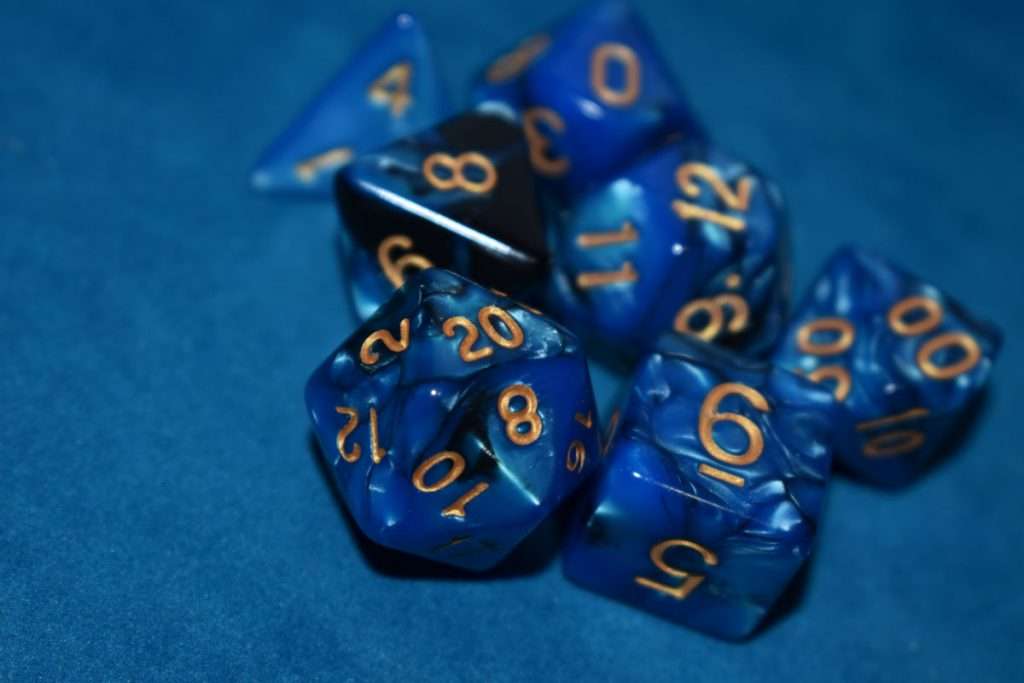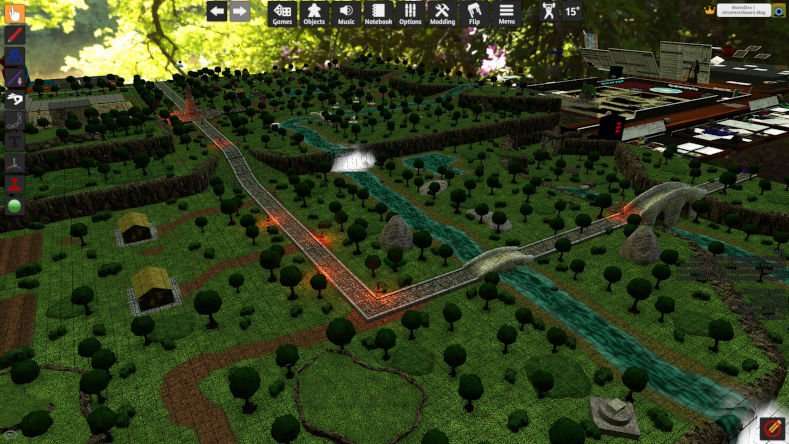Hi there, and welcome to Notes of Yore! In this post, I want to inform you about the virtual tabletop games and software that are available to enhance your Dungeons and Dragons experience. These visual aid tools are designed to give you and your group a representation of your playing field, and often work best when paired with ample use of theatre of the mind gameplay.
These tabletop simulations are fairly popular right now, due to the pandemic that has gripped the world. However, I will say that there are some nuances lost in a virtual setting that traditional campaign gatherings encompass. For example, you can’t easily have private conversations among your group due to the fact that, at least if you are using a voice client like discord, you are typically all sharing the same lobby. This in essence simulates you being directly next to others, no matter how close or far they actually are.
But, If you can get used to the idea of whispering via text, then all is not lost in that regard. I digress, I’m getting off-topic here.
So you are aware, this list is based on my personal experience, or what members of my group have recommended. This list is by no means complete, nor does it mean other virtual tabletop solutions aren’t good – I simply haven’t had the chance to really get to use them yet.
If you have a favorite VTT, let me know in the comments below what it is, and I’ll give it a good look when I can and add it to this list. With that out of the way, let’s begin!
Roll20 – A Free Dungeons and Dragons Virtual Tabletop Webapp

First on the list is the venerable Roll 20. This software is one of the most popular virtual tabletop options out there, as it is both free and fairly simple to use. I’ll be covering roll20 in more detail in later posts, specifically on how to do certain things like filling out a character sheet to reference in the game, or how to roll virtual dice, and maybe how to add your own tokens into Roll20.
Roll20 is what my own groups utilize to enhance our gameplay because it is simple enough to not be frustrating for people to use, while at the same time having enough features to make it an enhancement rather than a replacement.
If you’ve ever played games like Baldurs Gate 2, then you’ll know what I mean when I say some things change the experience beyond the idea of a tabletop game. Not to say that Baldurs Gate 2 is a bad game, quite the opposite actually. But I’d define it as a different kind of game with plenty of inspiration to its Dungeons and Dragons roots.
I Highly recommend using Roll20 as a Virtual Tabletop Solution. The fact that it is free and somewhat easy to use means that you and your group will have less friction in adopting a virtual solution for your games.
Pros:
- Very easy to use, even for people who have a difficult time using a computer (Once they’ve been introduced to the basics)
- Compatible with Tablets and Phones
- Ability to share your webcam feed or phone camera feed with the group
- Has microphone support
- Built-in Fog of War tools(to prevent people from seeing the entire map layout)
- Ability to create custom tokens for players and NPCs
- Virtual Dice rolling
- Extensions exist to Tie DND Beyond to it to use their system alongside it
- Virtual store for compendiums to access extra features
- In-app note-taking (In case you didn’t want to Buy our Session Notebook 😉 )
Cons:
- Can be intimidating to set up to new users
- 100MB limit on custom assets
- Only 2D map and art assets supported
- Susceptible to downtime (prevents you from accessing the website, very rare)
- Not everyone likes using this tool. I’ve had group members flat out refuse to create an account on roll20.
- Ads in your face until you are in-game (Adblocker handles most of them)
- Certain features can be buggy,
- Fog of war and multiple levels(like a multi-level cave) can be clunky to use for line of sight blocking.
- Music can freeze if running too long (Consider using a Discord Music Bot)
- A few other minor bugs are present. The team running roll 20 is working to eliminate the bugs.
Tabletop Simulator – A VR Compatible 3D Tabletop Environment

Another popular virtual tabletop option to host DND games is Tabletop Simulator. One of the biggest selling points of this VTT is that it is one of the few 3D Virtual Tabletop options available. Though, it is popular more for the fact that it is essentially 30,000+ tabletop games in one, rather than it being a good, easy-to-use VTT.
Additionally, one of the big features, assuming you have it, is that it is VR compatible. This allows those of you who have snazzy VR headsets like a Valve Index, Occulus Quest 2 (See this video for how to use this headset to play Tabletop Simulator), or other popular VR setups to use them during your sessions.
It is also cross-play – those that don’t have a VR setup can just use their computer mouse and keyboard with a traditional monitor. This is big because the adoption of virtual reality is slow coming due to the rather high costs of the hardware.
Personally, I love this game, but not as a tool for DND games. There are certainly a lot of cool mods out there on the steam workshop for this game that includes some really helpful tools. However, that is overruled by the fact that this virtual tabletop is fairly clunky to use, and at times, extremely frustrating for you and your players (Lost your dice on the map somewhere, objects can clip into the table, etc.).
I would not recommend using Tabletop Simulator for people who aren’t familiar with Tabletop Simulator. It isn’t worth the headache.
Pros:
- Support for Virtual Reality crossplay
- Tens of thousands of virtual minis to use
- Thousands of Steam Workshop mods that enhance gameplay
- Spell Cards,
- DM Descriptor cards,
- 3D modular Map Tiles
- 2D flat encounter maps
- DM Help tools
- and many many more
- Very immersive
- Built-in music player for ambiance/encounters
- Over 30,000+ Other tabletop games, including all DND versions out there, with more, added every day(it seems)
Cons:
- Not Free – Check Price on Humble Bundle
- Clunky to use due to wonky physics
- Controls aren’t all that intuitive
- Scripted mods can be very buggy (Particularly in-game player character sheets) especially if they haven’t been updated in awhile
- A lot of players will refuse to use this VTT option because of how frustrating the controls can be
- Players can abuse the flip table feature, and undo doesn’t always fix certain modded assets
- Very complicated to set up/use (I spent several hundred hours making a 3D world map for my players, only for everyone to get burnt out on it)
Foundry Virtual Tabletop – An Interesting Take on VTT design
Disclaimer: As I’ve never used Foundry Virtual Tabletop personally before, I can’t really say what makes it good or bad. However, because I have this perspective, I can say that, as a person who has browsed their website and looked over a few videos, I am intimidated by it. There is a lot to this thing, and I’m certain it does a good job at being a VTT solution based on the feedback of my group, but I just don’t feel comfortable with the idea of recommending it, given this fact.
I Included it on this list due to the positive feedback I received from my group. I will always stand by the notion of getting a second opinion for yourself, though.
Foundry Virtual Tabletop is an interesting addition to the selection of VTT options. This particular choice is fairly cost-effective, only requiring one person to buy the actual game itself in order for the whole group to use it, similar to how the Jackbox party games are. The rest connect to the game through the browser.
Think of Foundry as a Roll20 option on steroids, with a ton of features that cover a huge variety of different tabletop scenarios. However, it is these same features also make the tool somewhat complicated to use, due to the fact that you will probably be overwhelmed setting it up for your group. I’d even go so far as to say that you’ll probably need to follow a tutorial or twenty to understand how to do some of the things in this VTT solution.
Pros:
- Only one person (Usually the DM) needs to buy this for a group to use it
- Cool map building system
- Support for video assets to do a sort of Theatre of the mind with a visual stimulation
- Dynamic Fog of War works fairly well
- Fully customizable lighting systems that interact with walls
- Support for animated assets
- Support for a huge number of external tools, such as World Anvil, DND Beyond, Herovau.lt, The Forge, and more.
- Built in Modules
- Standard tabletop tools included: Turn manager, d4-d100 dice rolling, Audio player etc.
- Ability to upload your own mods and Templates
- And a LOT more. I’d even go so far as to say it has a bit of a feature bloat problem.
Cons:
- A ton of features make it intimidating for you or your DM to build a campaign.
- Overwhelming for new players to look it over and try to orient themselves
- (I can’t really list more here, because I haven’t actually used this VTT myself to find anything I genuinely consider to be a con.)





